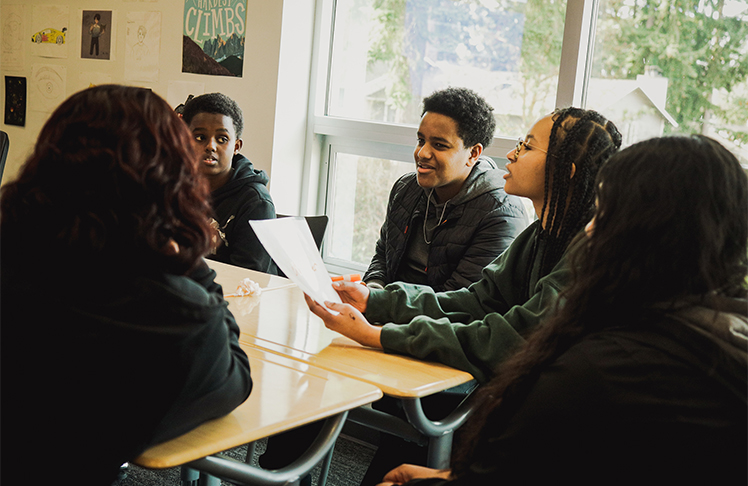
By Aaron Allen, The Seattle Medium
Why Not You Academy, a Washington charter public high school co-founded by former Seattle Seahawk Russell Wilson and his wife Ciara, alongside educator Scott Canfield, recently shared exciting news about receiving a $100,000 grant from the Limitless Learning Network.
The network, managed by Education First and backed by the Bill & Melinda Gates Foundation, focuses on postsecondary enrollment and brings together experts from across Washington state. The grant, distributed over four years, not only provides financial support but also includes technical assistance to facilitate collaboration and develop evidence-based solutions.
“The Limitless grant is a significant investment in the future of Washington state’s students,” said Kelly Kovacic Duran, Principal at Education First. “With Limitless, we can ensure more students access the resources and support they need to succeed in colleges, careers, and beyond.”
Located in Des Moines, Why Not You Academy serves a diverse group of 130 students, 90 percent of whom identify as BIPOC. According to Abi O’Neal, Chief Executive Officer at Why Not You Academy, the focus of the school, which is in its third year of operation, is to prepare their students to be college and career-ready.
“We are working with our academic community to increase post-secondary enrollment for our students,” said O’Neal. “We applied for this grant to be part of a network of schools and people in the state of Washington that are focused on improving post-secondary enrollment.”
According to advocates, charter schools offer many benefits to students, parents, teachers, and communities. At a charter school, decisions about how best to serve students aren’t made at a district office; instead, those decisions are made in the school by teachers and administrators who know the student population they serve.
In addition, a charter school’s ability to innovate extends to their efforts beyond the classroom and to their entire school community. Similar to what they do for their students, charter schools have proven to be committed to engaging parents and community members, often trying innovative strategies in order to accomplish this and succeed.
Derrick Harris, Director of Student Success at Why Not You Academy, says that one of the things that’s important is highlighting the school’s commitment to a holistic approach to education.
“Because we understand that education is not the key to success, but education is a key. Students have to have a holistic sense of safety, belonging, and community—all shape how students learn, how they comprehend, the safety to ask critical social questions.”
At Why Not You Academy, the intentional efforts to create a sense of belonging include imagery, languages, and reading materials that highlight diversity, fostering an environment where students feel they belong even before walking through the door.
Jaxon Rowland, a tenth-grader at Why Not You Academy, says that the environment at WNYA allows him to flourish, grow, and feel confident in himself.
“My challenges are being Black. People tell me how I present myself is how I want to be treated. So, every time I walk into a room, people are going to look at me differently based on the color of my skin,” says Rowland. “I am not that Black kid that no one can teach. I am someone that is smart, can have an intelligent conversation. One thing about my school is when you come here, you can be yourself. Every time you step in the door, you are going to find somebody that is going to like you for who you are.”
Harris says that the demographics of the school are a key component in its success.
“We are a school that intentionally reaches to service historically underrepresented communities specifically in a U.S. context,” said Harris. “So, our students still represent the global majority. One of the things we do is we instill that you belong. Your reason for being is the reason for your belonging.”
O’Neal emphasized the school’s intentional focus on being community-led, community-focused, and student-first.
“Our leadership team is one hundred percent global majority,” says O’Neal. “Our Board of Directors is 80 percent global majority; our student body is 98 percent global majority, black and brown. It is important to be community-led, community-focused, and student-first, and this is something we are doing intentionally.”
The innovative methods and intentional inclusivity at Why Not You Academy have contributed to its success, providing students with a unique and supportive learning environment. Charter schools, in general, have been making significant strides in the education sector, offering new options for families and demonstrating high acceptance rates at leading universities.
“Going to this school has offered me so many opportunities I got to experience,” shared Rowland. “Like going to HBCU tours, I went on an HBCU tour last year, I went and toured the U Dub and Seattle University. I was offered speaking engagements about my experience here.”
“The community, 98 percent Black. So, when I come to school, everybody looks like me, and I can connect with things that are going outside of school, inside school, and everybody helps each other because we look like each other,” added Rowland.
Harris agrees with the idea of belonging and believes this is what separates Charter schools from other academia.
“We say here, you belong before you ever walk through the door,” adds Harris. “And that’s different because we are already preparing for your arrival. The way it takes shape is through the imagery on our walls, the languages that are taught and spoken, the reading materials highlight students that are Black, Indigenous, people of color, so we do very well. Here at WNYA you belong here and that is different, something students will experience that they might not have experienced in our traditional public education setting. But these are things we take very seriously.”